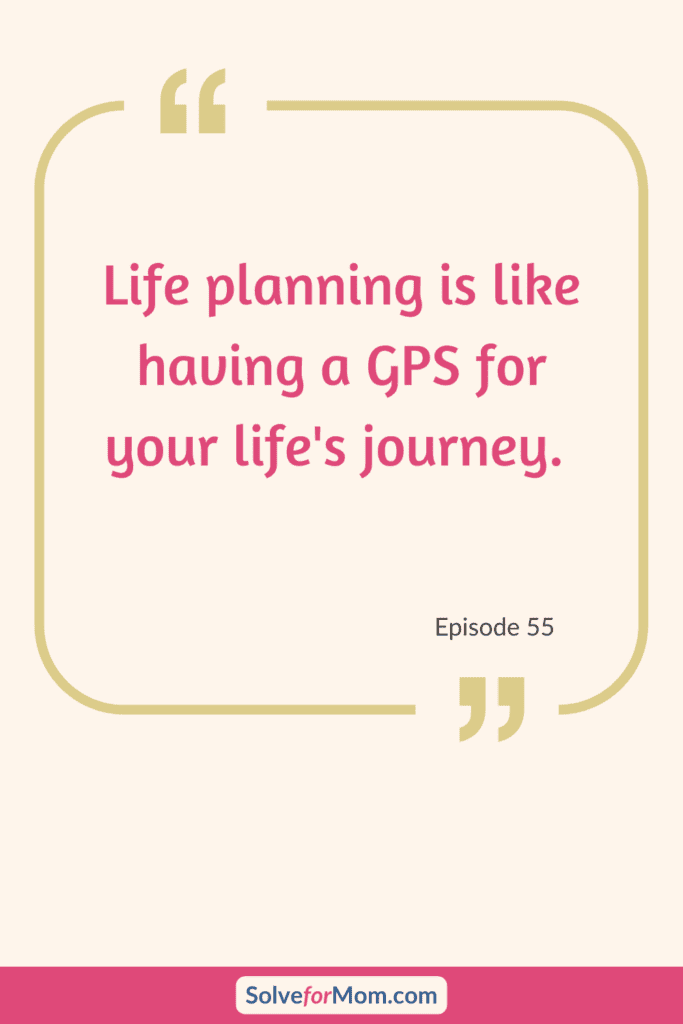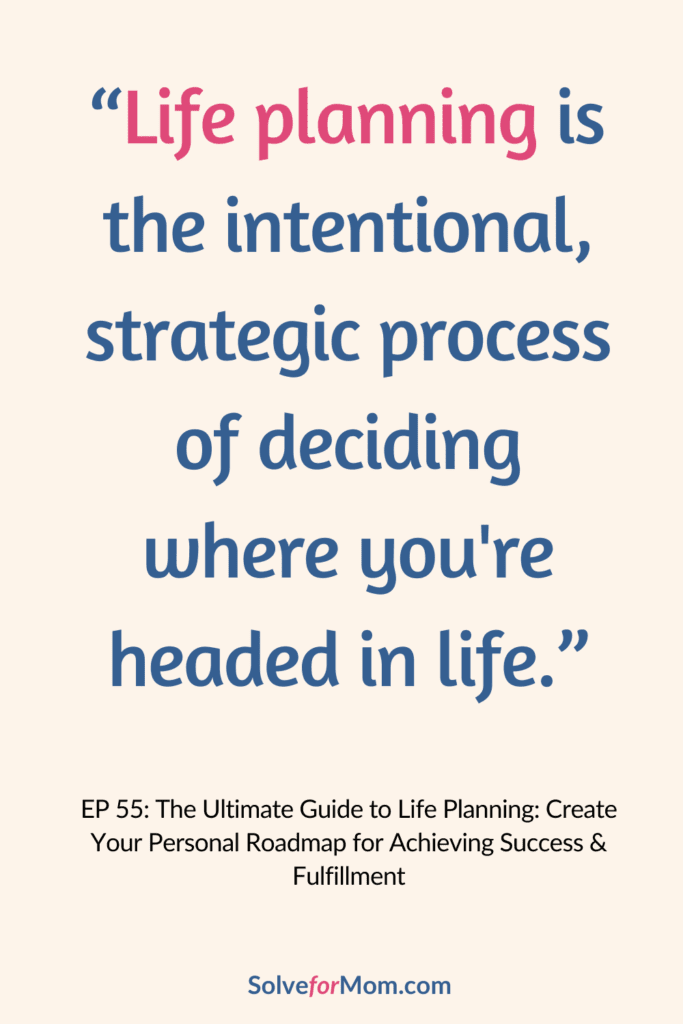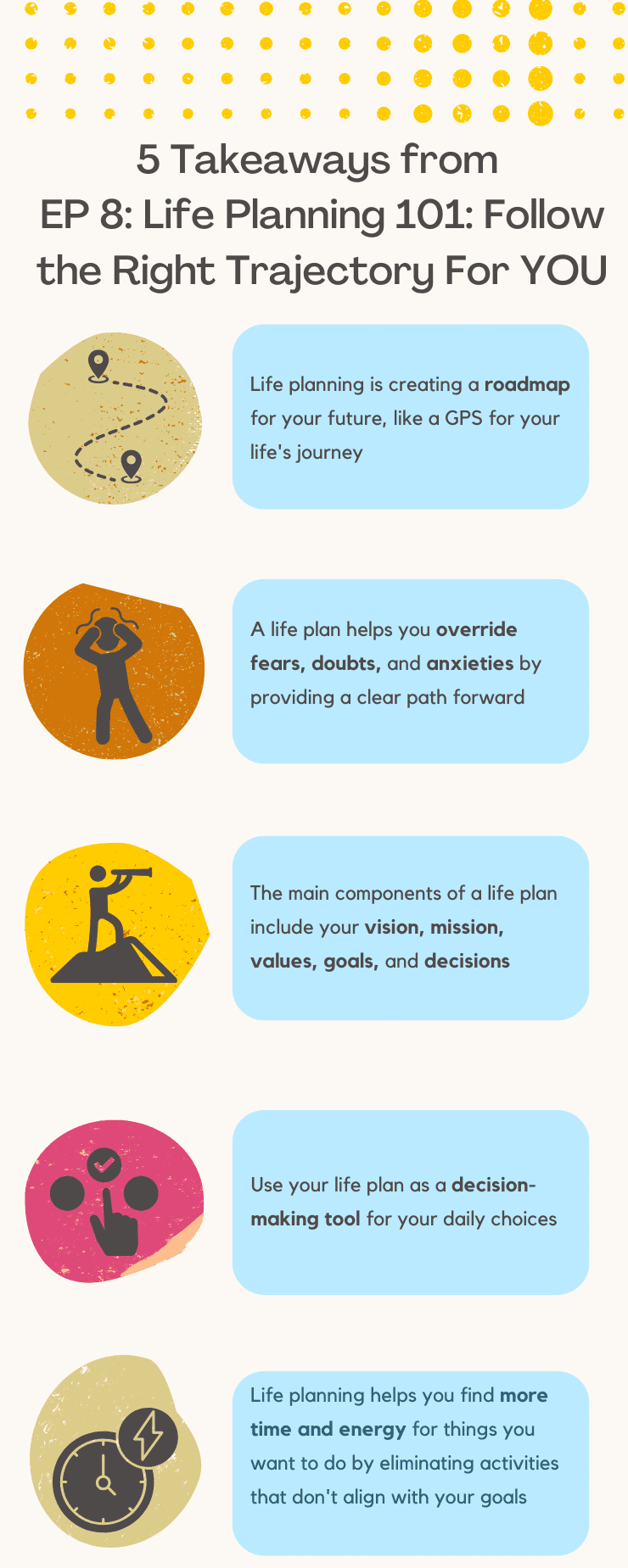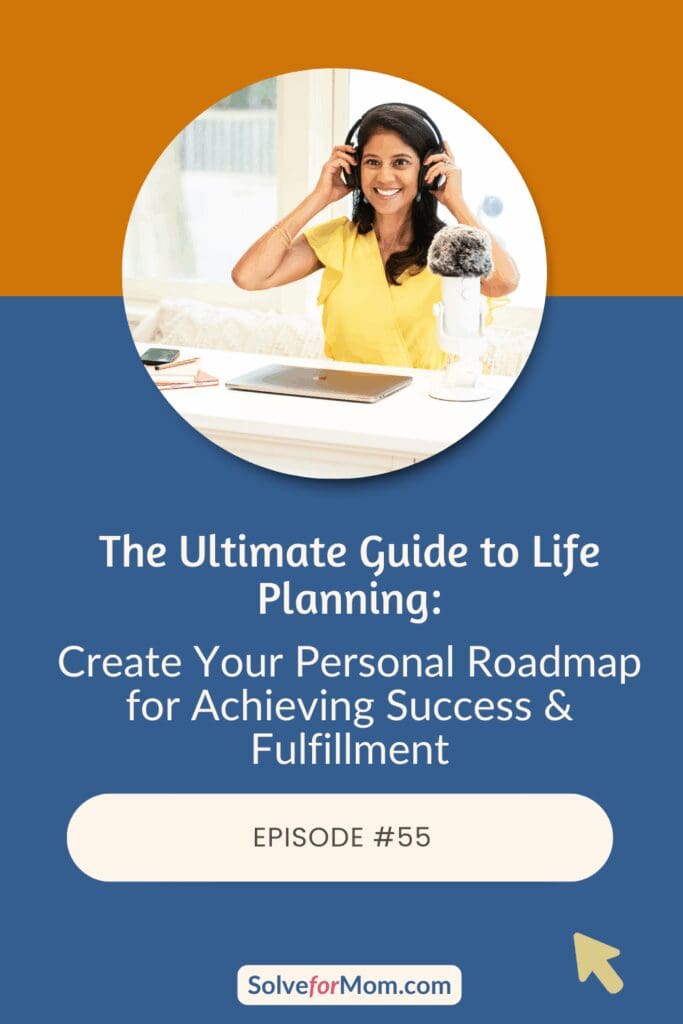- freebies -
It's All Yours
- blog posts -
Must-Read
If it involves goals, planning, and helping you live out your supermom dreams without compromising your time, energy, or family connection, then I'm betting we have a lot to talk about.
Stay Committed to How You Plan To Show Up for Yourself
Life Planning – How to Design & Achieve a Life That’s Right for You
July 9, 2025
This post will take your personal development to the next level. By the end of this episode, you’ll know exactly what life planning is, why you should have one, and how to start life planning now.
Are you struggling to get on the right trajectory? I know the feeling.
You want to be the best version of yourself, especially as a mother. You also want to do the things you love.
You might have noticed me occasionally using terms on my website such as: purpose, passion, mission, and vision. Now you’re finally going to see how everything connects.
Let’s stop winging it day after day and get on a clear path for success.
Reading the end of the book first?
You might have figured out by now that I love planning. I also gain comfort in knowing what’s next.
In fact, and please don’t hate me, but I’m one of those people who likes to read the end of the book first. I know—gasp! But before you groan, please hear me out.
I read a few chapters, get to know the characters, form a bit of an attachment to them, and as the story unfolds, I see the struggle being set up for the hero. I often get worried, anxious, curious, or I’m holding my breath to see what happens to them.
If I don’t know the outcome and how the story ends, I basically miss out on most of the book because I’m so anxious, stressed, or rushing just to find out what’s going to happen. I miss all the details and nuances, the beautiful and playful language, clever transitions, and cultural and geographical descriptions.
By reading the end of the book, I’m able to relax and soak in every page.
People often ask me, “Well, doesn’t that ruin the whole book for you? What’s the point of reading it anyway?” For me, there is still so much joy in the journey. I actually find it more enjoyable because, regardless of whether it’s a happy or sad ending, I’m able to pay attention to all the fun little details.
Life planning strategy
There’s a point to my story.
If our lives are a book, would you want to be stressed, anxious, holding your breath, and rushing through things?
Or would you rather be present in your life and enjoy your family time?
You can appreciate those small moments with your family, the sparks of wonder, and experience all the adventure that’s out there waiting for you.
I understand that nothing in life is guaranteed, but I believe planning is one of the best ways to achieve the outcome you hope for.
It’s like reading the end of the book, except this time you’re choosing the ending you wish for. Then you get to go back to your current chapter and write the rest of your book—the story of your life. You can make sure you reach that spectacularly fulfilling finale you’ve planned.
Let’s get into the basics of life planning for ambitious moms.

What is life planning?
Life planning is creating a roadmap that you’re going to follow. It’s like your life’s GPS, if you will—a navigation tool that guides you on a purposeful path.
There are so many analogies you can make between life planning and a GPS. Like a map on a GPS, there’s an obvious starting point and a destination point. You can view it zoomed in or zoomed out. You can even play with alternate routes if you want.
A life plan lays out the series of steps you’ll need to take to reach your final destination. It also includes landmarks you’ll pass—in your life’s roadmap, these would be milestones that mark your goals or successes.
The point of life planning is to help you achieve your personal and professional objectives.
Just like in my experience with skipping to the end of the book, your life plan helps you override fears, doubts, and anxieties because you’re no longer lost on back roads driving in the dark.
You’ll see a clear path from where you are to where you want to go.
You’ll have a plan—your plan—that keeps you on the right trajectory.
That doesn’t mean your journey will be easy. There will still be hard work, challenges, and bumps along the way, but that’s part of personal growth.
It’s okay if it takes time to execute your life plan because it’s a plan for your whole life. As you follow your custom-made roadmap, you’ll grow and stretch yourself—growth that requires time and patience.

Why is life planning important for ambitious moms?
I hope I already gave you some compelling reasons for why you should start life planning, but let’s go a little bit deeper.
The biggest benefit for me is that a life plan makes my vision feel possible because I see my dreams clearly articulated and mapped out.
I feel more in control—like I truly have a say in my life. I get a boost in confidence and feel motivated to grow and challenge myself. I’m ready to push myself to reach my goals.
It’s like when you’re trying to get fit. You could fumble around with random workouts, or you could follow a clear workout plan—a strategic approach to reaching your fitness goals systematically. You’ll be much more motivated and confident knowing you have a plan.
There are also practical reasons to have a life plan.
It dictates how you spend your time and serves as a reference point whenever you need to prioritize something in your life.
It’s a way to cross-check: “Does this expense, activity, or goal serve my ultimate objectives?” In this way, it becomes an invaluable decision-making tool.
When is the best time for life planning?
In short, my answer is now.
You can start anytime, but if you don’t have a plan yet, now is truly the best time.
It’s like asking, “When should I start eating healthy?” Well, always. So start now.
Having a plan can only help you—it won’t hinder you. Think of it as a guide, not a rigid box. There’s still plenty of room for spontaneity, pivots, and unexpected transitions.
Remember, this plan will be custom developed just for your goals and your life.

Who needs life planning?
If we’re talking about adults, I truly believe that everyone needs a life plan.
But I especially think that all moms need one.
This is central to my vision of Solve for Mom, where life crafting is an essential part of every motherhood journey.
Life planning is how you become your best self during motherhood.
It’s the primary method for helping you grow your individuality while also prioritizing family time.
Where can you start life planning?
The best place for you to do your life planning depends on your level of experience. I don’t want technology or perfectionism to become your bottleneck.
Working with a mom life coach is ideal, but for beginners just starting to brainstorm or tackling this independently, I suggest something as simple as a notebook or a Word document.
Keep in mind that your roadmap will evolve—it’s never fully set in stone. Your big vision and top-level components that feed into it usually remain constant, though smaller components occasionally change.
It’s like when you’re driving and take a detour because of a road closure. In life, this might represent an opportunity where a door has closed. Or when driving, you might spontaneously stop at a vista point you discover along the way. Life works similarly—you’ll encounter newly discovered passions you decide to pursue.
As your life plan evolves, you may want to use more sophisticated tracking and planning tools. Excel is a gentle way to do this. I personally use Notion—it’s my central hub for almost everything I plan.

How do you start life planning?
Now let’s get to the meat of it—how do you actually create a life plan? Below is a high-level explanation of the structure of life planning.
1. Plan your vision
One of my favorite problem-solving strategies is to work backwards, like the “check & chunk” method.
Using a backwards approach, you would first work on your vision.
This is the top of the plan—your destination. It represents your future and the impact you want to have on the world. When you open your GPS, it first asks for your destination. Well, that’s your vision. You create vision by deciding where you’ll be once your mission is completed and your purpose is realized. This applies to all areas of your life.
2. Plan your mission
The next part of your plan is the mission. This feeds directly into your vision and represents what you’re doing now to put your vision into action. My recommended approach involves creating a mission statement that articulates your passions and purpose. This should be ambitious yet achievable.
If you want to learn more about creating a mission statement, go back and listen to the episode about resetting with confidence. I’ve linked this show in the show notes as well. It explains how to find your purpose, identify your passions, and use those to create a mission statement. Don’t worry—I’ll have more in-depth episodes on developing your mission too.
Your top-level vision and mission, which include your passions and purpose, form the overarching plan for your life. These tend not to change at all, or very infrequently.
3. List your top values
Before explaining what falls under the top sections of your life plan, I want to mention one component that underpins the entire plan: your values.
Typically, your personal, world, and family values overlap extensively. Your personal values, which reflect your individuality, may include additional ideals and beliefs. Your values span your entire roadmap. Each component in the life plan must align with your personal values. Otherwise, you’ll be trying to achieve things inconsistent with who you are or want to be.
Your values are the principles you live by—virtues that speak to your character and who you’re trying to be. They represent the core of who you are and what you believe, often with moral and ethical dimensions.
I’m sure if you spend even five minutes, you’ll create a beautiful list identifying your values. I do this once a year, listing all my values that I strive to live by, then circle my top five. I’ve done this for several years, and my top ten almost never change. I bet if you compare your values to your husband’s top values, they’d be mostly the same or similar. It’s actually a fun date activity!
Being clear on your values serves as an important decision-making tool outside of life planning too.
4. Personalized goals
The final part of life planning involves your goals and decisions—the nitty-gritty details. Your goals represent the “how” of it all. They’re stepping stones to fulfilling your bigger mission. Many factors must fall into place for your goals to succeed.
Your goals are achieved through informed decision-making but also require personal growth factors we’ll work on in other episodes, such as time management, habits, and discipline.
Returning to our GPS analogy: if your goal is reaching your destination by a certain time, this requires decisions. Which car will you drive? When must you leave? Can you stop for lunch? Do you have enough gas?
Let’s apply this to a life vision. Say your vision is to live in harmony with nature and promote green living because you see us as part of a bigger ecosystem and want to pass on a healthy earth to the next generation.
It’s one thing to have this grand vision but another to execute your plan. You execute through goals. A specific goal might be eliminating toxic chemicals from your house—specifically pesticides and forever chemicals that leach into soil—and only purchasing green products free of these chemicals within six months.
This requires decisions: What plastics can you buy? What food? What clothing can you keep? Will you allow exceptions for unavoidable items?
Here’s how the life plan works: based on your top-level plan, you’ll have multiple goals beneath it, with each goal involving multiple decisions, all working within the bubble created by your values. Each decision you make as part of your goals requires clarity about everything above in your life plan because they map to that desired outcome. These become your day-to-day decisions.

Life planning simplifies decisions
Can you see how life planning simplifies your life? You’ll eliminate anything not aligned with your life plan that doesn’t serve your personal, world, or family vision.
And just like that, you’ve found yourself with more time.
I’m not saying you don’t have to do things just because you don’t want to. Self-development and personal growth often involve doing things you don’t want to do, especially if they serve your ultimate vision. It almost certainly involves doing hard things—that’s part of the growth process. You’ll feel uncomfortable, then grow into that position until it becomes your new normal, and then strive for something new.
When it comes to things you don’t want to do, you can’t avoid them just because they’re hard.
But there might be valid reasons why you don’t want to do something. You can examine your life plan to see if that’s the case—perhaps it’s something you’re not passionate about or you don’t believe it fuels your purpose. Those are good reasons why you might choose not to spend your time a certain way.
Life planning is a powerful tool
With this post, you’re now on your way to clarity in your life path and better decision making. You’ll be able to eliminate stress and self-doubt in your daily life and find more time for the things you truly want to do. That’s how powerful life planning is.
In this introduction to life planning, we’ve discussed the who, what, where, when, why, and how of creating your plan. I’ve provided the main framework and how to get started—and I hope you’ll begin today.
For an easy starting point, make your values list first. Then, after a couple of days, go back and listen to the episode about resetting to pursue your passion work with confidence and create your mission statement.
If you want more help, reach out to me at hello at solveformom.com. I’m building additional resources around this topic, so stay tuned. By emailing me, I can ensure you have access to more resources and you can influence what content I create next.
How to start life planning
PICK ONE TIP TO TRY TODAY
- 🔲 Create a comprehensive list of your personal values
- 🔲 Write a vision statement for yourself and your family
- 🔲 Develop your mission statement
- 🔲 Set 1-3 SMART goals that align with your vision
- 🔲 Review your daily decisions and eliminate those not serving your life plan
- 🔲 Get personalized coaching with a life planning strategist
IF YOU LIKED THIS BLOG
- Subscribe to the Achieve Your Ambitious Mom Life podcast and share it with other high-achieving mothers
- Ask a question or share your thoughts. Your message could be the topic of an upcoming podcast episode!
EP 8: Life Planning 101: Follow the Right Trajectory For YOU
EP 35: Planning For Your Future by Prioritizing Your Values Now
Leave a Reply